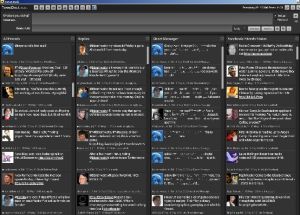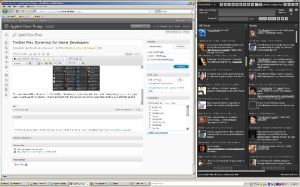
Featured Blog | This community-written post highlights the best of what the game industry has to offer. Read more like it on the Game Developer Blogs.
@bbrathwaite discusses why Twitter's worth your time and offers suggestions to build your community.

If you're a game developer, you want to be on Twitter. If you don't have a twitter account, get one. You can find me at @bbrathwaite.
You can do all your facebook and twitter stuff in one place.
Set up beyond sign up
Twitter doesn't work unless you work it. The first step in this process is the building of your interface and your community.
For interface, I recommend TweetDeck. TweetDeck comes pre-optimized and shows you several classes at once. The image below shows the mambo view with the following feeds, left to right: those I am following, replies (or anything with a mention of my UID @bbrathwaite), direct messages to me and direct messages I have sent, and finally, facebook status updates.
td1
You want the replies window open for a few reasons:
This is the only way you will see comments addressed to you if you are not following the person in question
This is the easiest way to track re-tweets of your tweets.
This is the easiest way to track tagged messages that mention you.
You can create additional feed columns that will, for instance, show you every mention of your name, your game, your company name or anything else you desire. I traditionally go for the two column view. Here's a shot of my desktop as I write this article. It doesn't feel constrained.
td2
You will likely also need an app for your iPhone. I use Tweetie. It's a pay app at $2.99. I got tired of the funkiness of the free ones. There may be better ones out there now, however.
Building Your Community
With Tweetdeck up and running, you next need to build your community. This is the "work it" portion. Community building is most efficiently done this way:
Pick a friend you like and look at who they follow. I follow these people. You need to be logged into your twitter account to see this. Follow some.
Check out the selection at GameIndustryTweet.com. They are missing a lot of devs, but it's a good place to start.
You can also explore Wefollow.com and submit yourself there, too.
I also recommend adding game industry press and other media you want pushed at you. You can find @gamasutra there and many others. Check my follow list.
Win States
There are several win states to twitter:
Community (social warm-fuzzies): Since I've been active, I have a good group of devs with whom I correspond openly on twitter. It's just random banter back and forth sometimes. However, I've also seen the community rally around a dev that just closed, and many of us re-tweet releases of our community's projects. It is a quick and immediate way to spread the word about anything. It provides a wonderful space in between our physical meetings at conferences.
Community (professional debates): It's a little hard to follow at times, but epic design discussion have broken out on twitter with some of the industry's leading designers. It's incredible to join in.
High score (follower number): Have a higher follower number than everyone else. People get into it on Facebook. They'll get into it here, too.
Time saved & Immediacy (having news pushed at you): I get an amazing amount of my news through twitter now. If the link interests me, I read the article on the relevant site. All the major game sites push news now as do the major news sites you already go to.
Networking (contacting and being contacted): My twitter feed is open meaning that anyone can see it. I've been contacted about my recent games a whole lot, have been asked to speak at a conference and participate in an interview today.
Route to blog: I've noticed a number of devs pointing followers to new articles on their blog or otherwise related to their projects or interests. When I started to do this, my readership went up by ~ 15%. Of course, it depends on how big your follower list is, and if you're active, it will build over time.
Dynamics
The dynamics of twitter "follow" propagation work like this:
No addition: You can lock your feed so that only your approved followers can read your updates.
Replying to people: When you reply to people or people reply to you, you expand the number of eyes on your UID or theirs. This inevitably picks up additional followers.
Posting valuable information: A link to a particularly good article, an announcement or a something that's worth repeating leads to a "re-tweet". When someone re-tweets your info, they include your UID as a part of that. Since this is being broadcast to their entire followers' list, additional followers are gained.
Public reappropriation: A number of news places are following dev twitter feeds, and posting them in roundups or on blogs. Those that get picked up inevitably get more followers. Be careful what you tweet, though.
Block addition: you can block anyone from following your feeds through the options.
Read more about:
Featured BlogsAbout the Author(s)
You May Also Like








